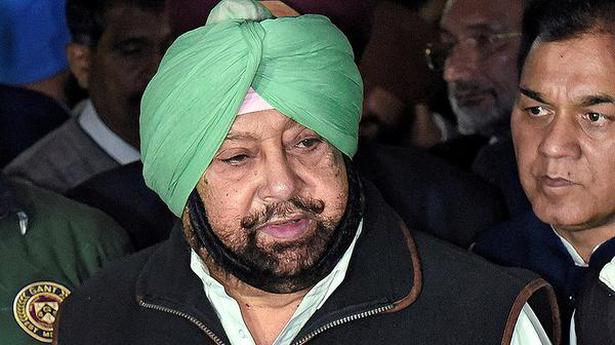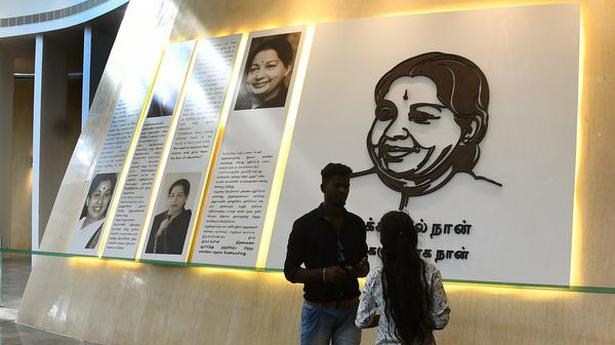| Former Punjab Chief Minister Amarinder Singh on Thursday made it clear that he would be leaving the Congress party as he felt 'humiliated' by the leadership that had replaced him with Charanjeet Singh Channi. He more or less ruled out joining the BJP as well, despite his much-talked about meeting with Union Home Minister Amit Shah on Wednesday evening. "I will resign…will not stay in the party," he said in a statement released by his team, and clarified that he was still thinking through his options in the interest of Punjab and its security. "I will not be treated in this humiliating manner…I will not take such insults," his statement quoted him as saying, adding that his "principles and beliefs do not allow him to stay in the Congress".  Singh met National Security Advisor Ajit Doval on Thursday morning, where he said he talked about the security situation in the sensitive border State. "My experience showed that the people of Punjab tend to vote for a single party/fora, irrespective of the number of parties in the fray. Misgovernance in Punjab would give Pakistan the opportunity to create trouble in the State and in the country," he said, adding that his meeting with Doval was centred on this theme. The long-running farmers' protest against the three contentious farm laws were issues that he discussed with Shah and tangentially with Doval, as the agitation with no end to the confrontation was inimical to the security of the State. Singh said those undermining the growing Pakistani threat in Punjab were playing into the hands of anti-India forces by being in denial mode, a direct hit at Congress leader Navjyot Singh Sidhu. "They [Pak-backed elements] are killing our soldiers every day. They are pushing weapons into the State through drones. How can we overlook such dangers?" In his visit to Delhi, which he had said was to just collect his things from Kapurthala House (the official home for the Punjab Chief Minister in Delhi) and hand it over to his successor, Singh managed to delineate his political plans quite clearly. The prospects of Singh floating his own party and even walking away with some Congress MLAs who owe him loyalty seem open. His rhetoric and campaign will rest on not just a narrative of being humiliated by the Congress, but also high nationalism and concern for issues regarding farmers, and most of all, the need to have a stable government that can guarantee security at the borders. The BJP, on its part keen to end its confrontation with farmers' groups, especially in Haryana and Punjab where its party workers are facing hostility, is eager to press Singh into finding a solution out of the maze of this issue. Singh's anti-Pakistan, nationalistic credentials also make him a good fit in the BJP's ideological calculus. For his own party, the Congress, which he is set to exit, Singh had some home truths: "Senior Congressmen are the thinkers but they are being sidelined." He condemned the attack on former Union Minister Kapil Sibal's residence by Youth Congress workers for what he termed "choosing to express views that were not palatable to the party leadership". AICC Treasurer Pawan Bansal said, "Capt. Amarinder Singh's assertion that he had been humiliated is not correct. The fact is that most of the 74 Congress MLAs did not want him as CM, yet the party continued with him and only repeatedly requested that he should respect party MLAs' sentiments regarding Bargari sacrilege, electricity costs, and sand mafia. He failed to act. It was only then that he was asked to resign."  SC asks govt to ensure farmers' groups are made parties in case The Supreme Court on Thursday said the government had to take the initiative to ensure that organisations of farmers, who are blocking the Capital's arterial border roads with Uttar Pradesh and Haryana against the Central agricultural laws, were made parties in efforts to resolve the nearly year-old impasse. A Bench led by Justice S.K. Kaul stated that the issue could be resolved either through Parliament debates or in the judicial forum, but the blocking of highways and inconveniencing of commuters cannot go on perpetually. The court was hearing a petition filed by Noida resident Monica Agarwal, who highlighted that the blocks caused by the protests had turned her daily commute between Noida and Delhi a nightmare. Solicitor General Tushar Mehta noted that farmers were refusing to participate in talks before a high-level committee. Sections of highways have become inaccessible due to their protests. He suggested that farmers' organisations be made parties in the current petition. The court urged the government to take the initiative to make them parties rather than depend on Agarwal and other private citizens. Justice Kaul observed, "How will they know which organisations have to be made parties?" The Bench asked the government to file an application seeking permission to implead farmers' bodies in the case. The court listed the case on Monday. The court had consistently taken a nuanced stand on the issue, saying farmers have the right to protest but their agitation should not hinder traffic or public movement. It had pointed out that the solution to end the farmer-government impasse over the three agriculture laws lay with the government. Protesting farmers have been camping on the outskirts of the Capital for over a year. Recently, U.P. and Haryana filed affidavits in the court that said despite "sincere efforts", farmers were not relenting.  Supreme Court adjourns Jayalalithaa death inquiry case The Supreme Court on Thursday scheduled for October 20 a case concerning the Justice (retired) A. Arumughaswamy Commission of Inquiry into the death of former Tamil Nadu Chief Minister J. Jayalalithaa in 2016. A Bench of Justices S. Abdul Nazeer and Krishna Murari adjourned the hearing after senior advocate Aryama Sundaram, who appears for Apollo Hospitals where Jayalalithaa died, cited a personal difficulty. Senior advocate Dushyant Dave, for the Tamil Nadu government, raised strong objection to the adjournment. However, the court agreed to hear the case after the Dussera holidays. In the previous hearing, the Inquiry Commission had said that only four witnesses remain to be examined and the panel should be allowed to complete its work and place its fact-finding report before the State Legislative Assembly.  The proceedings before the Commission were stayed by the Supreme Court in April 2019 on the basis of a plea by Apollo Hospitals that the inquiry panel's functioning was "replete with bias". "Only four witnesses are left to examine. A fact-finding inquiry report should be presented in the House. The House will then decide… 155 witnesses have been examined… only four more. The inquiry has been pending since 2017," the panel had submitted. In 2019, the court had stayed the inquiry after Apollo Hospitals alleged that the Commission, instead of conducting an impartial inquiry, had transformed itself into an adversary. Sundaram had argued for the hospital that the proceedings before the inquiry panel was causing "grave prejudice" to the hospital's reputation. Tamil Nadu had, in 2019, urged the court to not stay the Commission proceedings. However, the Bench had refused to oblige the State and proceeded to freeze the inquiry. The State had appointed the inquiry commission headed by Justice Arumughaswamy, a retired Madras High Court judge, on September 25, 2017. The Commission's reference was to examine the circumstances which led to the hospitalisation of Jayalalithaa on September 22, 2016 and the nature of treatment given in order to determine the cause of hospitalisation.  Tamil prisoners file Fundamental Rights petition in Sri Lanka's Supreme Court As many as eight Tamil prisoners in Sri Lanka's Anuradhapura prison on Thursday petitioned the country's Supreme Court, seeking relief after a 'gun-wielding' Prisons Minister allegedly threatened them a fortnight ago. The prisoners stated that they fear for their lives, asking to be transferred to a prison in the Tamil-majority Northern Province. Jaffna parliamentarian and senior lawyer M.A. Sumanthiran will appear for them in the case, media reports said. On September 15, Lohan Ratwatte, who was State Minister of Prison Management and Prisoners' Rehabilitation, stepped down from the portfolio amid enormous pressure, after allegations of him asking Tamil prisoners to kneel, threatening them at gunpoint, surfaced. Ratwatte is still a junior Minister in the Rajapaksa administration, overseeing the Gem and Jewellery portfolio, although government critics have demanded that he be sacked from all positions, citing the reported incident that sparked much public outrage. In their petition, the prisoners accused the Minister of asking the detainees to stand in a semi-circle and "ordered them to kneel before him". "He then started to abuse them in Sinhala saying that His Excellency the President had given him all the power in relation to PTA prisoners and that he could either release them or shoot them dead. He had a pistol in his hand and appeared to be intoxicated," the petition stated. The Minister's office earlier denied any wrongdoing on his part. The eight Tamil men -- who have sought relief from the Supreme Court through Colombo-based lawyer Moahan Balendra -- are in remand following their arrest under Sri Lanka's infamous Prevention of Terrorism Act (PTA). Rights activists and Tamil political leaders have for long demanded repeal of the PTA, pointing to different governments' tendency to use the law to target dissidents or arbitrarily detain "terrorism suspects" for long periods without trial. Soon after the violent incident in the prison complex -- allegedly involving the Prisons Minister -- was reported in the media, the country's Human Rights Commission started a suo motu investigation. International human rights watchdogs were swift to condemn the Minister's actions. Human Rights Watch said the incident reflected "the disregard for human rights that prevails under the administration of President Gotabaya Rajapaksa, and in particular the vulnerable position of people held under the PTA."  Covid Watch: Numbers and Developments The number of reported coronavirus cases from India stood at 3,37,62,154 at the time of publishing this newsletter, with the death toll at 4,48,294. Around 69% of the country's adult population has received at least one dose of COVID-19 vaccine and 25% has taken both doses, the government said on Thursday. It also said that increased population density raises chances of COVID-19 spread and it will be prudent to avoid non-essential travel and observe festivity at low key. The government said that 64.1% doses of COVID-19 vaccine has been administered in vaccination centres in rural areas and 35% in urban areas. A total of 67.4 lakh doses (approximately 0.88%) have been administered at vaccination centres not tagged as rural or urban, it said. It said that 59.66% of the total COVID-19 cases last week were reported from Kerala and the state has over one lakh active cases. The government also stressed that the number of COVID-19 tests has not reduced and 15 to 16 lakh tests are being done every day in the country.  In BriefOutput from India's eight core sectors accelerated for the second successive month in August, rising 11.6%, compared to a 6.9% contraction recorded a year ago, with four sectors registering strong double-digit growth, although crude oil and fertilisers output declined. The August output was 3.9% higher than pre-COVID levels compared to July, which recorded a 1.1% uptick above 2019 levels. The monsoon is likely to begin withdrawing from the mainland from October 6, said the India Meteorological Department as the country recorded an average of nearly 87 cm of rainfall across subdivisions, just short of the nearly 88 cm it normally receives during the monsoon. The quantum of rains during the monsoon is counted as that received between June1- September 30. September rainfall, at 223 mm, has been the second highest since 1993 when it got 239 mm (40% above normal). In 2019, India recorded nearly 250 mm, or about 52% more than normal.  Evening Wrap will return tomorrow. |
Post a Comment